Unit 3 How do you get to school? Section B 2a-2d& 3a-3b 课件43张
文档属性
| 名称 | Unit 3 How do you get to school? Section B 2a-2d& 3a-3b 课件43张 | 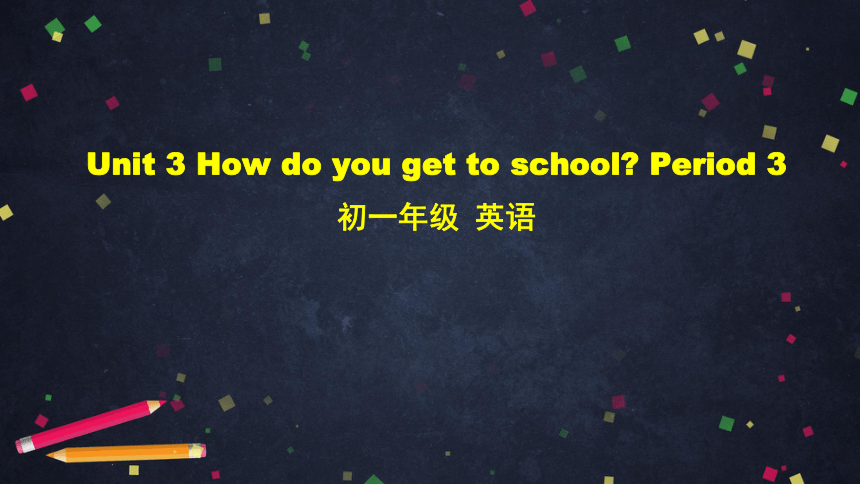 | |
| 格式 | pptx | ||
| 文件大小 | 9.2MB | ||
| 资源类型 | 试卷 | ||
| 版本资源 | 人教新目标(Go for it)版 | ||
| 科目 | 英语 | ||
| 更新时间 | 2021-02-26 07:58:57 | ||
图片预览

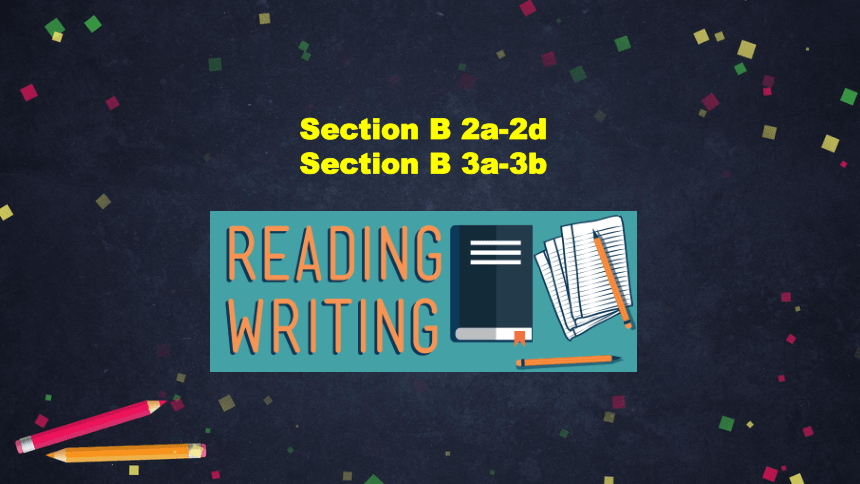
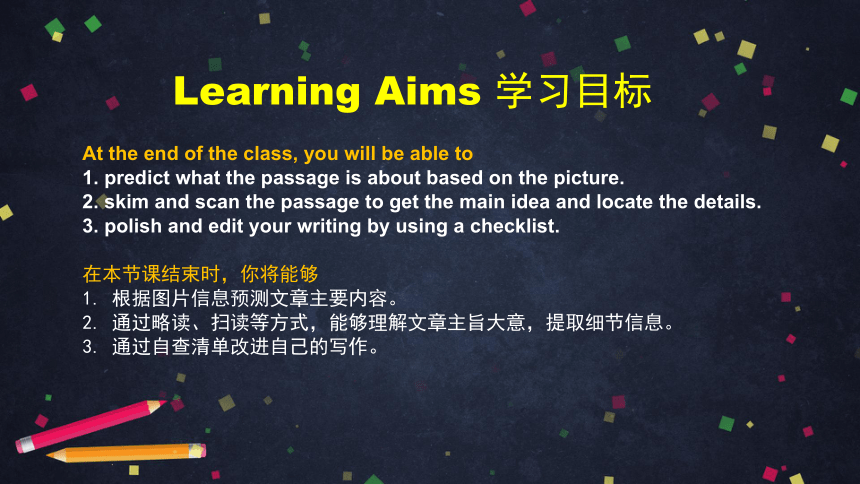
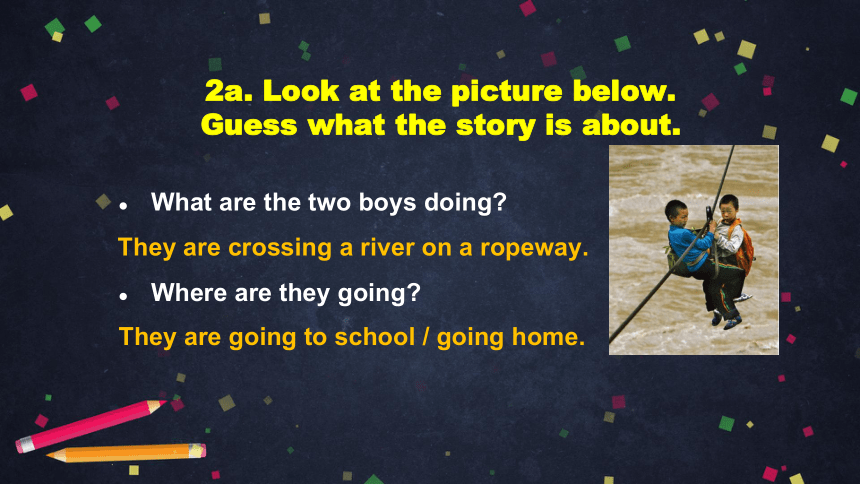
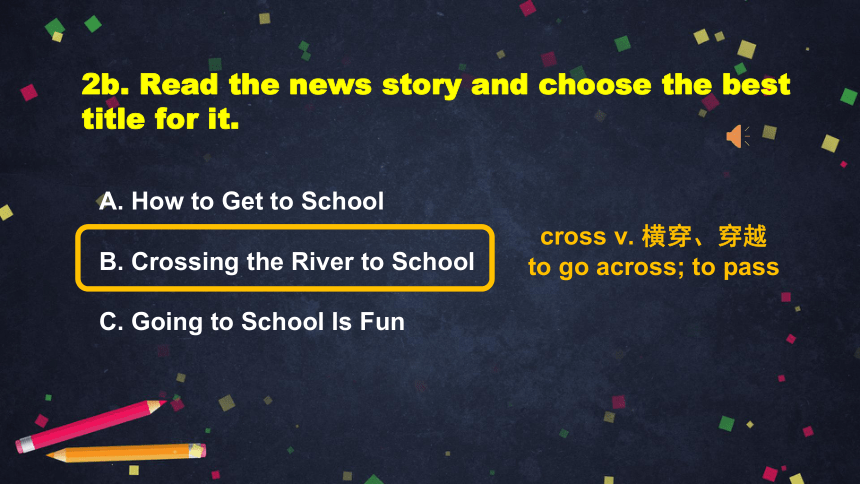
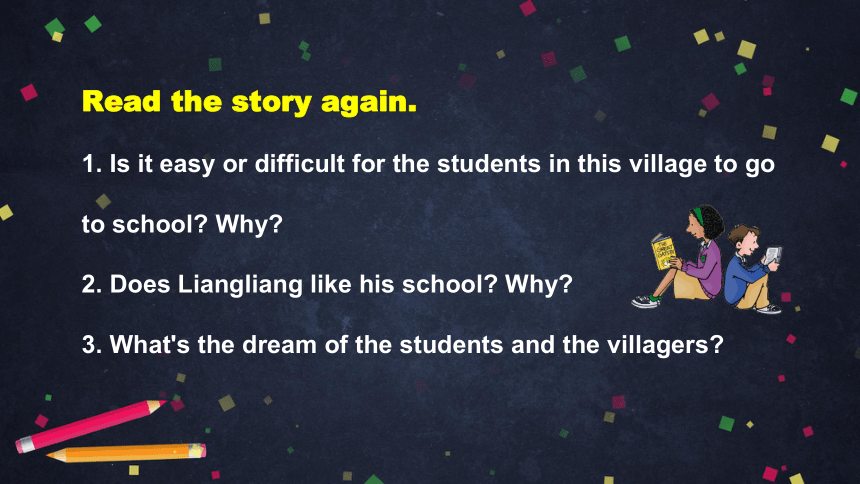
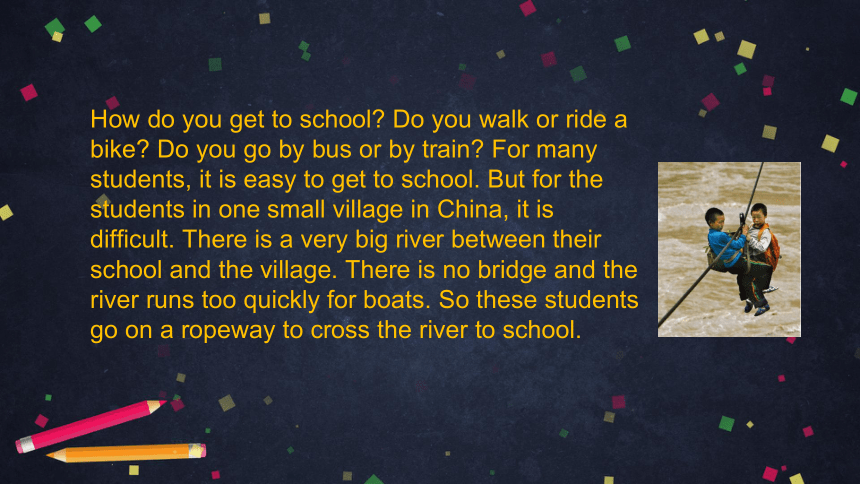
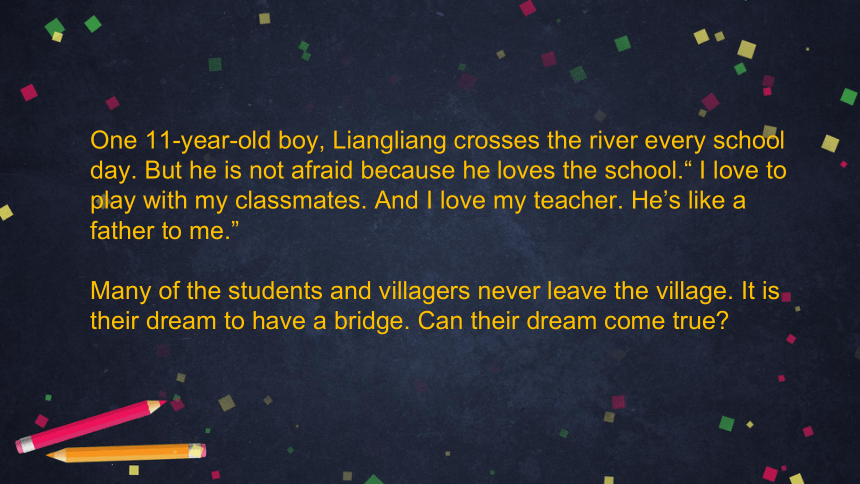
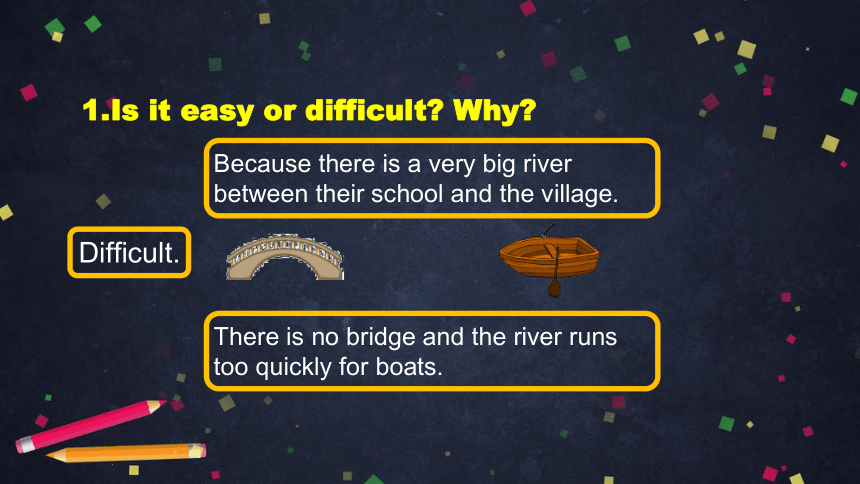
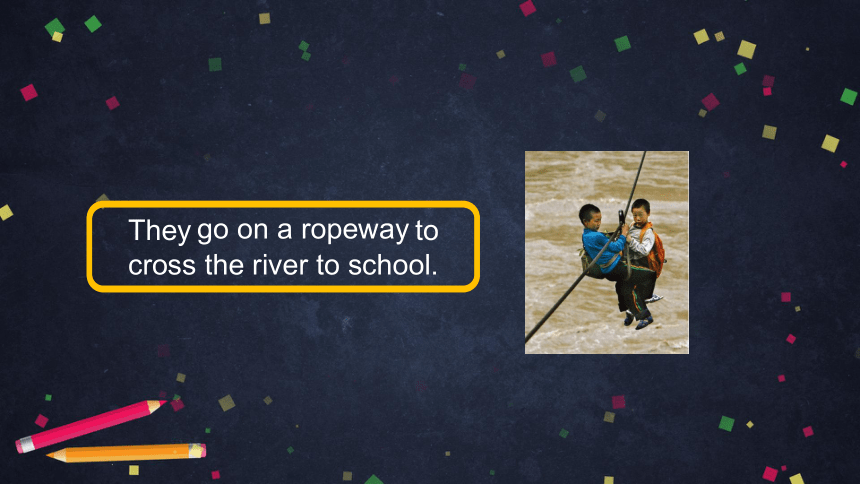
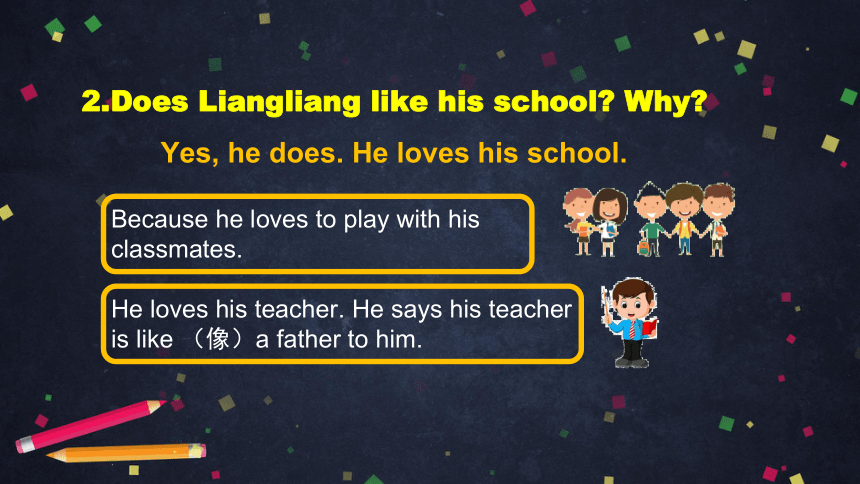
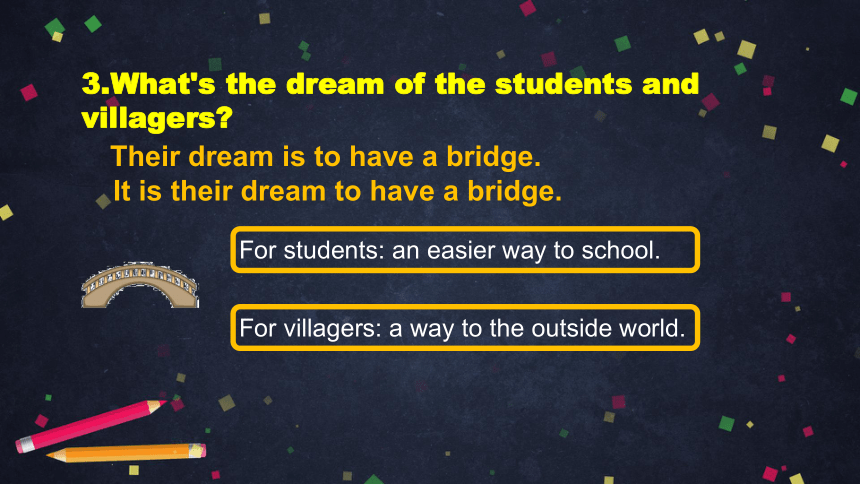
文档简介
Unit 3 How do you get to school? Period 3
初一年级 英语
Section B 2a-2d
Section B 3a-3b
At the end of the class, you will be able to
1. predict what the passage is about based on the picture.
2. skim and scan the passage to get the main idea and locate the details.
3. polish and edit your writing by using a checklist.
在本节课结束时,你将能够
1. 根据图片信息预测文章主要内容。
2. 通过略读、扫读等方式,能够理解文章主旨大意,提取细节信息。
3. 通过自查清单改进自己的写作。
Learning Aims 学习目标
They are crossing a river on a ropeway.
They are going to school / going home.
2a. Look at the picture below.
Guess what the story is about.
What are the two boys doing?
Where are they going?
2b. Read the news story and choose the best title for it.
A. How to Get to School
B. Crossing the River to School
C. Going to School Is Fun
cross v. 横穿、穿越
to go across; to pass
Read the story again.
1. Is it easy or difficult for the students in this village to go to school? Why?
2. Does Liangliang like his school? Why?
3. What's the dream of the students and the villagers?
How do you get to school? Do you walk or ride a bike? Do you go by bus or by train? For many students, it is easy to get to school. But for the students in one small village in China, it is difficult. There is a very big river between their school and the village. There is no bridge and the river runs too quickly for boats. So these students go on a ropeway to cross the river to school.
One 11-year-old boy, Liangliang crosses the river every school day. But he is not afraid because he loves the school.“ I love to play with my classmates. And I love my teacher. He’s like a father to me.”
Many of the students and villagers never leave the village. It is their dream to have a bridge. Can their dream come true?
1.Is it easy or difficult? Why?
Because there is a very big river between their school and the village.
Difficult.
There is no bridge and the river runs too quickly for boats.
go on a ropeway
They to cross the river to school.
2.Does Liangliang like his school? Why?
Yes, he does. He loves his school.
He loves his teacher. He says his teacher is like (像)a father to him.
Because he loves to play with his classmates.
3.What's the dream of the students and villagers?
For students: an easier way to school.
For villagers: a way to the outside world.
Their dream is to have a bridge.
It is their dream to have a bridge.
2c. Read the story again and complete the interview.
Reporter: How do you to school?
Liangliang: I go on a ropeway to the river to school.
Reporter: Are you ?
Liangliang: No, I'm not. Because I my school and my teachers. I like to with my classmates at school.
Reporter: Is it for you to go to school?
Liangliang: Yes, it is.
Reporter: Do you want to have a ?
Liangliang: Yes. It's our dream.
Reporter: I'm sure your dream can come .
2c. Read the story again and complete the interview.
Reporter: How do you to school?
Liangliang: I go on a ropeway to the river to school.
Reporter: Are you ?
Liangliang: No, I'm not. Because I my school and my teachers. I like to with my classmates at school.
go/get
cross
love
play
afraid
afraid adj. 害怕的
Reporter: Is it for you to go to school?
Liangliang: Yes, it is.
Reporter: Do you want to have a ?
Liangliang: Yes. It's our dream.
Reporter: I'm sure your dream can come .
true
difficult
bridge
Do you think their dream can come true?
2d. Now there is a bridge across the river and the children do not have to go on the ropeway to get to school anymore.
Imagine you are a reporter and want to interview a student in the school. Make up a conversation.
Sample conversation (对话示例,请看任务单)
Reporter: How do you get to school, Meiling?
Meiling: I walk across the bridge and cross the river to get to school.
Reporter: Does it take a long time?
Meiling: No, it doesn’t.
Sample conversation (对话示例,请看任务单)
Reporter: Do you know students had to use a ropeway to get to school 10 years ago?
Meiling: Yes, I do! My father told me about it.
Reporter: How do you feel about it?
Meiling: I think our lives are much easier now!
Let's compare! (请看任务单)
Liangliang
Meiling
cross the river
to school
How do they go to school?
Does it take a long time?
Is it easy or difficult?
I go on a ropeway.
I walk across a bridge.
Yes.
No.
It is difficult.
It is much easier.
What do you learn from the comparison (比较)?
Work hard.
Dream big.
Seize the day.
Cherish what we have.
ride a bike
骑自行车
Let's review some chunks!
语境中复习词块(请看任务单)
Let's review some chunks!
语境中复习词块(请看任务单)
cross the river
过河
run quickly
流得快;水流湍急
Let's review some chunks!
语境中复习词块(请看任务单)
go on a ropeway
乘索道
Let's review some chunks!
语境中复习词块(请看任务单)
play with classmates
和同学一起玩
Let's review some chunks!
语境中复习词块(请看任务单)
(be) like a father
像父亲一样
Let's review some chunks!
语境中复习词块(请看任务单)
leave the village
离开村子
Let's review some chunks!
语境中复习词块(请看任务单)
come true
实现、成真
Let's review some chunks!
语境中复习词块(请看任务单)
ride a bike
cross the river
run quickly
go on a ropeway
Try to retell the story
(运用复习的词块,结合故事的过去的情况和现在的发展,
试着复述一下这个故事)
play with classmates
(be) like a father
leave the village
come true
3a. Read the e-mail from your pen pal Tom in the US. Fill in the blanks with the words in the box.
kilometers get to
takes walk
boring leave
Fill in the blanks with the words in the box.
Hi there,
How are you? Thanks for your last e-mail.
You want to know how I school,
right? Well, I usually my home at
about 8:00 and to the bus stop.
The school bus usually comes at about 8:15.
get to
leave
walk
Fill in the blanks with the words in the box.
My school is about 20 from my
home. It about 40 minutes to get
there by bus. The bus ride is never
because I always talk to my classmates.
What about you? How do you get to school?
Tom
kilometers
takes
boring
3b. Send an e-mail to Tom and tell him how you get to school.
Plan your writing.
写作准备工作(请看任务单)
Let’s get started!
My way to school
When do you leave home?
How do you get to school?
I usually leave home at ...
I usually go to school by bike/ bus/ subway ...
I usually go to school on foot.
I usually ride/ walk/take the bus to school.
Do you like your trip to school?
How long does it take you to get to school?
It is about ...kilometers from my home to school.
It takes (me) about ... minutes to get to school.
I (don't) like my trip to school because ...
Plan your writing.
写作准备工作(请看任务单)
How far is it from your home to school?
Plan your writing.
写作准备工作(请看任务单)
interesting exciting
comfortable fun
relaxing enjoyable
tiring sleepy
crowded boring
Activities
listen to music
talk with friends
chat with parents
sing songs
enjoy the view
...
First writing. 初稿写作(请看任务单)
Hi Tom,
Thank you for your e-mail. Let me tell you how I get to school.
________________________________________________________
________________________________________________________
________________________________________________________
Your friend,
Li Hua
Revise & Edit. 修改初稿(请看任务单)
I read my writing twice after first writing. 完成一稿后,我读了两遍。
I answered all of the questions. 所有问题我都回答了。
I used space between my words. 单词之间我都空格了。
My editing checklist 我的写作核查表
Revise & Edit. 修改初稿(请看任务单)
I capitalized the first letter in a sentence. 每一句话的首字母我都大写了。
I used punctuation marks correctly. 我正确使用了标点。
I spelt the words correctly. 每一个单词我都拼写正确了。
I wrote in complete sentences. 我写的都是完整句。
My editing checklist 我的写作核查表
Hi Tom,
Thank you for your e-mail. Let me tell you how I get to school.
I usually leave my home at 6:30. Then I walk to the subway station and take the subway to school. My school is about 30 kilometers from my home. It takes about 35 minutes to get there by subway. I like the subway ride because it is fast and convenient.
Your friend,
Li Hua
Summary
Reading
Crossing the River to School
Predict some information
Get the main idea
Locate the details
Cherish our school life
Writing
My way to school
Plan through flow chart
Write a draft
Polish it through checklist
Write neatly
Homework
Finish the first writing and polish it with the help of “My editing checklist”. Then complete the final version.
完成写作练习,在自我检查表的帮助下修改一稿,并工整地誊抄终稿。
初一年级 英语
Section B 2a-2d
Section B 3a-3b
At the end of the class, you will be able to
1. predict what the passage is about based on the picture.
2. skim and scan the passage to get the main idea and locate the details.
3. polish and edit your writing by using a checklist.
在本节课结束时,你将能够
1. 根据图片信息预测文章主要内容。
2. 通过略读、扫读等方式,能够理解文章主旨大意,提取细节信息。
3. 通过自查清单改进自己的写作。
Learning Aims 学习目标
They are crossing a river on a ropeway.
They are going to school / going home.
2a. Look at the picture below.
Guess what the story is about.
What are the two boys doing?
Where are they going?
2b. Read the news story and choose the best title for it.
A. How to Get to School
B. Crossing the River to School
C. Going to School Is Fun
cross v. 横穿、穿越
to go across; to pass
Read the story again.
1. Is it easy or difficult for the students in this village to go to school? Why?
2. Does Liangliang like his school? Why?
3. What's the dream of the students and the villagers?
How do you get to school? Do you walk or ride a bike? Do you go by bus or by train? For many students, it is easy to get to school. But for the students in one small village in China, it is difficult. There is a very big river between their school and the village. There is no bridge and the river runs too quickly for boats. So these students go on a ropeway to cross the river to school.
One 11-year-old boy, Liangliang crosses the river every school day. But he is not afraid because he loves the school.“ I love to play with my classmates. And I love my teacher. He’s like a father to me.”
Many of the students and villagers never leave the village. It is their dream to have a bridge. Can their dream come true?
1.Is it easy or difficult? Why?
Because there is a very big river between their school and the village.
Difficult.
There is no bridge and the river runs too quickly for boats.
go on a ropeway
They to cross the river to school.
2.Does Liangliang like his school? Why?
Yes, he does. He loves his school.
He loves his teacher. He says his teacher is like (像)a father to him.
Because he loves to play with his classmates.
3.What's the dream of the students and villagers?
For students: an easier way to school.
For villagers: a way to the outside world.
Their dream is to have a bridge.
It is their dream to have a bridge.
2c. Read the story again and complete the interview.
Reporter: How do you to school?
Liangliang: I go on a ropeway to the river to school.
Reporter: Are you ?
Liangliang: No, I'm not. Because I my school and my teachers. I like to with my classmates at school.
Reporter: Is it for you to go to school?
Liangliang: Yes, it is.
Reporter: Do you want to have a ?
Liangliang: Yes. It's our dream.
Reporter: I'm sure your dream can come .
2c. Read the story again and complete the interview.
Reporter: How do you to school?
Liangliang: I go on a ropeway to the river to school.
Reporter: Are you ?
Liangliang: No, I'm not. Because I my school and my teachers. I like to with my classmates at school.
go/get
cross
love
play
afraid
afraid adj. 害怕的
Reporter: Is it for you to go to school?
Liangliang: Yes, it is.
Reporter: Do you want to have a ?
Liangliang: Yes. It's our dream.
Reporter: I'm sure your dream can come .
true
difficult
bridge
Do you think their dream can come true?
2d. Now there is a bridge across the river and the children do not have to go on the ropeway to get to school anymore.
Imagine you are a reporter and want to interview a student in the school. Make up a conversation.
Sample conversation (对话示例,请看任务单)
Reporter: How do you get to school, Meiling?
Meiling: I walk across the bridge and cross the river to get to school.
Reporter: Does it take a long time?
Meiling: No, it doesn’t.
Sample conversation (对话示例,请看任务单)
Reporter: Do you know students had to use a ropeway to get to school 10 years ago?
Meiling: Yes, I do! My father told me about it.
Reporter: How do you feel about it?
Meiling: I think our lives are much easier now!
Let's compare! (请看任务单)
Liangliang
Meiling
cross the river
to school
How do they go to school?
Does it take a long time?
Is it easy or difficult?
I go on a ropeway.
I walk across a bridge.
Yes.
No.
It is difficult.
It is much easier.
What do you learn from the comparison (比较)?
Work hard.
Dream big.
Seize the day.
Cherish what we have.
ride a bike
骑自行车
Let's review some chunks!
语境中复习词块(请看任务单)
Let's review some chunks!
语境中复习词块(请看任务单)
cross the river
过河
run quickly
流得快;水流湍急
Let's review some chunks!
语境中复习词块(请看任务单)
go on a ropeway
乘索道
Let's review some chunks!
语境中复习词块(请看任务单)
play with classmates
和同学一起玩
Let's review some chunks!
语境中复习词块(请看任务单)
(be) like a father
像父亲一样
Let's review some chunks!
语境中复习词块(请看任务单)
leave the village
离开村子
Let's review some chunks!
语境中复习词块(请看任务单)
come true
实现、成真
Let's review some chunks!
语境中复习词块(请看任务单)
ride a bike
cross the river
run quickly
go on a ropeway
Try to retell the story
(运用复习的词块,结合故事的过去的情况和现在的发展,
试着复述一下这个故事)
play with classmates
(be) like a father
leave the village
come true
3a. Read the e-mail from your pen pal Tom in the US. Fill in the blanks with the words in the box.
kilometers get to
takes walk
boring leave
Fill in the blanks with the words in the box.
Hi there,
How are you? Thanks for your last e-mail.
You want to know how I school,
right? Well, I usually my home at
about 8:00 and to the bus stop.
The school bus usually comes at about 8:15.
get to
leave
walk
Fill in the blanks with the words in the box.
My school is about 20 from my
home. It about 40 minutes to get
there by bus. The bus ride is never
because I always talk to my classmates.
What about you? How do you get to school?
Tom
kilometers
takes
boring
3b. Send an e-mail to Tom and tell him how you get to school.
Plan your writing.
写作准备工作(请看任务单)
Let’s get started!
My way to school
When do you leave home?
How do you get to school?
I usually leave home at ...
I usually go to school by bike/ bus/ subway ...
I usually go to school on foot.
I usually ride/ walk/take the bus to school.
Do you like your trip to school?
How long does it take you to get to school?
It is about ...kilometers from my home to school.
It takes (me) about ... minutes to get to school.
I (don't) like my trip to school because ...
Plan your writing.
写作准备工作(请看任务单)
How far is it from your home to school?
Plan your writing.
写作准备工作(请看任务单)
interesting exciting
comfortable fun
relaxing enjoyable
tiring sleepy
crowded boring
Activities
listen to music
talk with friends
chat with parents
sing songs
enjoy the view
...
First writing. 初稿写作(请看任务单)
Hi Tom,
Thank you for your e-mail. Let me tell you how I get to school.
________________________________________________________
________________________________________________________
________________________________________________________
Your friend,
Li Hua
Revise & Edit. 修改初稿(请看任务单)
I read my writing twice after first writing. 完成一稿后,我读了两遍。
I answered all of the questions. 所有问题我都回答了。
I used space between my words. 单词之间我都空格了。
My editing checklist 我的写作核查表
Revise & Edit. 修改初稿(请看任务单)
I capitalized the first letter in a sentence. 每一句话的首字母我都大写了。
I used punctuation marks correctly. 我正确使用了标点。
I spelt the words correctly. 每一个单词我都拼写正确了。
I wrote in complete sentences. 我写的都是完整句。
My editing checklist 我的写作核查表
Hi Tom,
Thank you for your e-mail. Let me tell you how I get to school.
I usually leave my home at 6:30. Then I walk to the subway station and take the subway to school. My school is about 30 kilometers from my home. It takes about 35 minutes to get there by subway. I like the subway ride because it is fast and convenient.
Your friend,
Li Hua
Summary
Reading
Crossing the River to School
Predict some information
Get the main idea
Locate the details
Cherish our school life
Writing
My way to school
Plan through flow chart
Write a draft
Polish it through checklist
Write neatly
Homework
Finish the first writing and polish it with the help of “My editing checklist”. Then complete the final version.
完成写作练习,在自我检查表的帮助下修改一稿,并工整地誊抄终稿。
同课章节目录
- Unit 1 Can you play the guitar?
- Section A
- Section B
- Unit 2 What time do you go to school?
- Section A
- Section B
- Unit 3 How do you get to school?
- Section A
- Section B
- Unit 4 Don't eat in class.
- Section A
- Section B
- Unit 5 Why do you like pandas?
- Section A
- Section B
- Unit 6 I'm watching TV.
- Section A
- Section B
- Review of Units 1-6
- Unit 7 It's raining!
- Section A
- Section B
- Unit 8 Is there a post office near here?
- Section A
- Section B
- Unit 9 What does he look like?
- Section A
- Section B
- Unit 10 I'd like some noodles.
- Section A
- Section B
- Unit 11 How was your school trip?
- Section A
- Section B
- Unit 12 What did you do last weekend?
- Section A
- Section B
